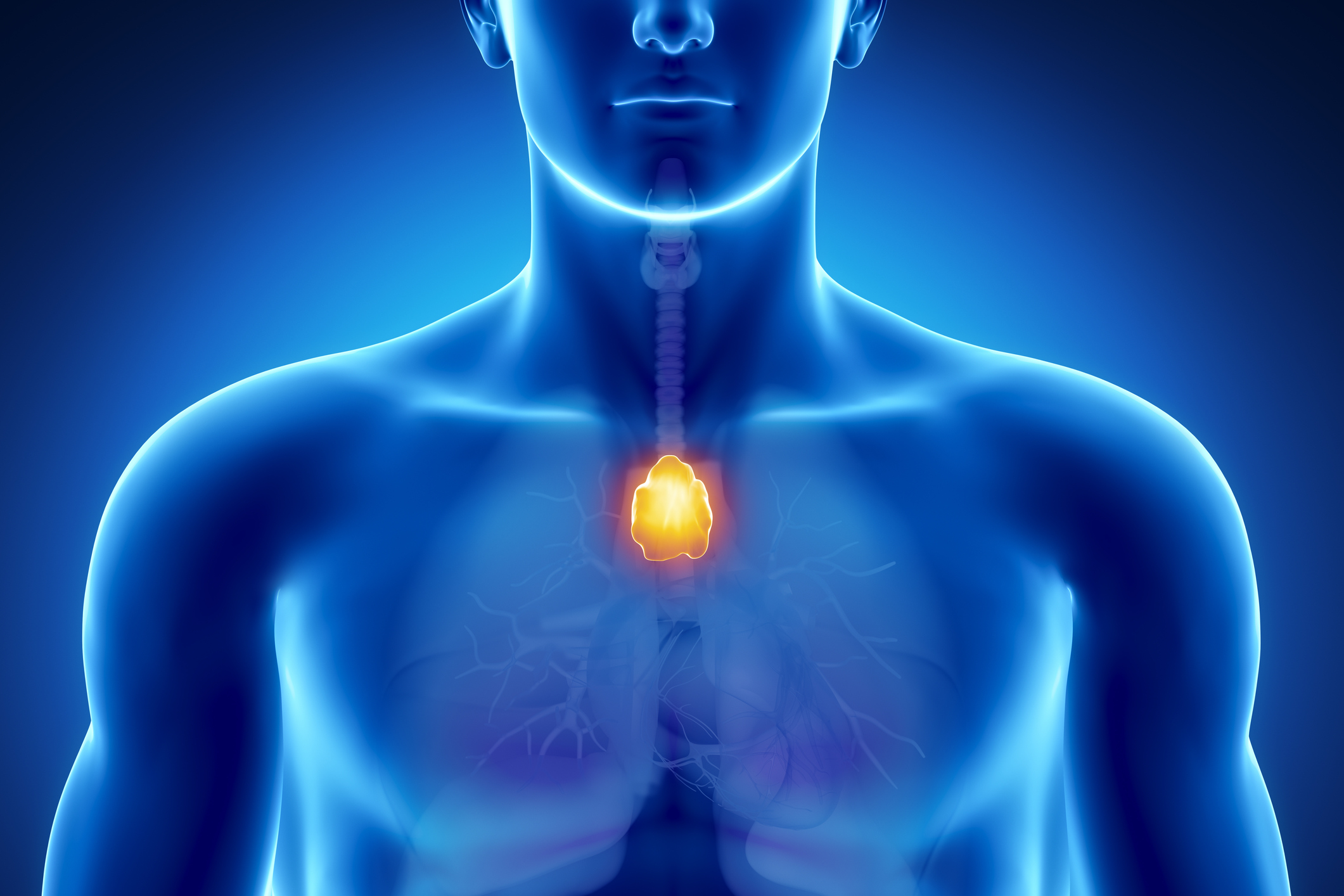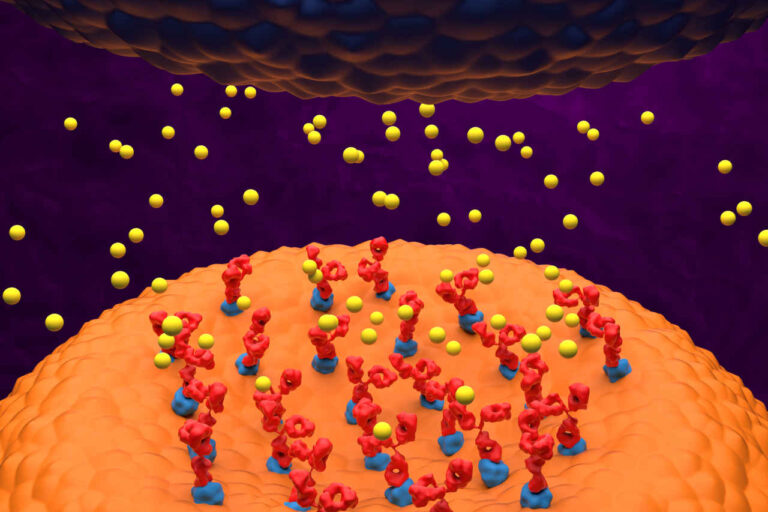
Bệnh nhược cơ (MG) là một bệnh tự miễn gây yếu cơ. Trong tình trạng này, hệ thống phòng thủ của cơ thể tấn công nhầm vào các thụ thể thần kinh. Kết quả là mí mắt, cử động mắt, hơi thở, nuốt và chân tay của bạn bị ảnh hưởng.
Nói chuyện với chuyên gia về hỗ trợ đồng thanh toán
U tuyến ức là một khối u hiếm gặp phát triển trong tuyến được gọi là tuyến ứcCó mối liên hệ giữa bệnh nhược cơ và u tuyến ức. Nhiều người mắc bệnh nhược cơ cũng bị u tuyến ức và ngược lại. Trong bài viết này, chúng ta sẽ tìm hiểu về bệnh nhược cơ và u tuyến ức, mối liên hệ giữa chúng và các lựa chọn điều trị.
Bệnh nhược cơ (MG) là gì?
Bệnh nhược cơ (MG) là một bệnh tự miễn tiến triển hiếm gặp. Mỗi năm, cứ 1 triệu người thì có tới 30 người mắc bệnh này [1]. Trong tình trạng này, hệ thống miễn dịch của cơ thể tấn công nhầm vào các thụ thể trên tế bào cơ. Kết quả là, các tín hiệu từ não không thể truyền đến cơ một cách hiệu quả. Điều này dẫn đến suy nhược và mệt mỏi ở các cơ mặt, sọ và cơ thể.
Các triệu chứng của MG có thể khác nhau về mức độ nghiêm trọng. Người bệnh sẽ cảm thấy yếu cơ tăng dần khi vận động, và tình trạng này sẽ giảm bớt khi nghỉ ngơi. Không có cách chữa khỏi, nhưng có các lựa chọn như dùng thuốc, liệu pháp và phẫu thuật để kiểm soát các triệu chứng và cải thiện chất lượng cuộc sống.
U tuyến ức là gì?
U tuyến ức là một loại khối u hiếm gặp phát triển ở tuyến ức. Tuyến ức nằm ở ngực, ngay sau xương ức. Tuyến này đóng vai trò quan trọng trong hệ thống miễn dịch của cơ thể. Nó thúc đẩy sự trưởng thành của các tế bào. Tế bào T, là một loại tế bào bạch cầu có chức năng chống lại nhiễm trùng.
U tuyến ức thường phát triển chậm và có thể mất nhiều tháng hoặc nhiều năm mới thấy sự tăng trưởng đáng kể. Chúng không gây ra bất kỳ triệu chứng nào trong giai đoạn đầu. Tuy nhiên, khi chúng phát triển lớn, chúng có thể gây ra các triệu chứng như đau ngực, ho, khó thở, v.v.
Mối liên hệ giữa bệnh nhược cơ và u tuyến ức là gì?
Bệnh nhược cơ (MG) là một bệnh lý trong đó hệ thống miễn dịch của cơ thể tấn công các vùng giao tiếp giữa dây thần kinh và cơ. Hậu quả là sự thiếu hụt giao tiếp này gây ra tình trạng yếu cơ và mệt mỏi. Mặt khác, u tuyến ức là một khối u hiếm gặp phát triển trong tuyến ức. Tuyến này giúp hệ miễn dịch hoạt động bình thường.
U tuyến ức thường liên quan đến bệnh nhược cơ (MG). Dữ liệu cho thấy khoảng một nửa số bệnh nhân u tuyến ức phát triển MG, và khoảng 15% bệnh nhân MG phát triển u tuyến ức [2].
Tuy nhiên, các bác sĩ không biết chính xác liệu u tuyến ức gây ra MG hay MG gây ra u tuyến ức. Tuy nhiên, một giả thuyết thuyết phục cho rằng khi tuyến ức có vấn đề (như u tuyến ức), nó sẽ gửi các tín hiệu gây nhầm lẫn đến hệ thống miễn dịch. Kết quả là, hệ thống miễn dịch tấn công các thụ thể trên tế bào cơ, và do đó MG xảy ra.
U tuyến ức phổ biến hơn ở những bệnh nhân phát triển MG ở độ tuổi trẻ hơn, từ 30 đến 60. Nếu MG bắt đầu khi ai đó trên 60 tuổi, họ ít có khả năng bị u tuyến ức [3].
Các triệu chứng của bệnh nhược cơ và u tuyến ức

Các triệu chứng của bệnh nhược cơ (MG) và u tuyến ức có thể khác nhau tùy thuộc vào từng cá nhân và mức độ nghiêm trọng của tình trạng bệnh.
MG gây ra tình trạng yếu cơ, trở nên tồi tệ hơn khi vận động và cải thiện khi nghỉ ngơi. Điều này dẫn đến các triệu chứng như:
- Khó ăn hoặc khó nuốt
- Mờ mắt
- Mí mắt sụp xuống
- Yếu tay và chân
- Nói lắp bắp
- Khó thở
Người mắc MG phải trải qua các xét nghiệm như chụp X-quang để phát hiện sự hiện diện của u tuyến ức. Ở giai đoạn đầu, u tuyến ức không biểu hiện bất kỳ triệu chứng nào. Khi kích thước u lớn dần theo thời gian, nó có thể dẫn đến các triệu chứng như:
- Đau ngực
- Ho
- Khó thở
- Khó nuốt
Vui lòng tham khảo ý kiến chuyên gia chăm sóc sức khỏe nếu bạn có các triệu chứng liên quan đến một trong hai tình trạng trên. Họ có thể chẩn đoán và điều trị phù hợp cho bạn.
Nhận Hỗ trợ Đồng thanh toán IVIG | Hỗ trợ Tài chính IVIG
Điều trị bệnh nhược cơ và u tuyến ức
Bệnh nhược cơ không có cách chữa khỏi hoàn toàn. Tuy nhiên, có một số phương pháp điều trị giúp kiểm soát các triệu chứng và nâng cao chất lượng cuộc sống. Các phương pháp điều trị nhược cơ bao gồm:
Thuốc men: Thuốc có thể cải thiện sức mạnh cơ bắp và giảm các triệu chứng. Bác sĩ thường kê đơn thuốc như thuốc ức chế cholinesterase, thuốc corticosteroidvà kháng thể đơn dòng.
Trao đổi huyết tương: Đây là một thủ thuật nhằm loại bỏ các kháng thể có hại khỏi huyết tương của bạn.
Immunoglobulin tiêm tĩnh mạch (IVIG): IVIG cung cấp một liều kháng thể cô đặc được lấy từ huyết tương hiến tặng. Thuốc có thể giúp giảm các triệu chứng của MG và cải thiện sức mạnh cơ bắp.
Ca phẫu thuật: Cho dù bạn có u tuyến ức hay không, phẫu thuật cắt bỏ tuyến ức có thể giúp ích rất nhiều trong các trường hợp MG [5].
Điều trị u tuyến ức thường bao gồm phẫu thuật. Nếu u tuyến ức không phải ung thư, chỉ cần phẫu thuật cắt bỏ tuyến ức là đủ. Tuy nhiên, nếu u tuyến ức là ung thư, cần điều trị bổ sung, chẳng hạn như hóa trị, cùng với phẫu thuật.
Câu hỏi thường gặp
Sau đây là một số câu hỏi thường gặp về bệnh nhược cơ và u tuyến ức:
1. Bệnh nhược cơ được chẩn đoán như thế nào?
Để chẩn đoán bệnh nhược cơ, bác sĩ sử dụng kết hợp nhiều xét nghiệm. Chẩn đoán thường bao gồm xét nghiệm máu để kiểm tra các yếu tố cụ thể. kháng thể. Nó cũng bao gồm các nghiên cứu về dẫn truyền thần kinh và điện cơ đồ (EMG).
2. U tuyến ức có phải lúc nào cũng là ung thư không?
Không. U tuyến ức có thể lành tính (không phải ung thư) hoặc ác tính (ung thư). May mắn thay, phần lớn chúng đều không phải ung thư. Trong cả hai trường hợp, bạn đều cần theo dõi thường xuyên và điều trị đúng cách.
3. Có bất kỳ thay đổi lối sống nào có thể giúp kiểm soát các triệu chứng của bệnh nhược cơ không?
Đúng vậy, bệnh nhân MG có thể sống tốt hơn nếu họ học cách kiểm soát căng thẳng. Họ nên ngủ đủ giấc, ăn một chế độ ăn uống cân bằngvà tránh những thứ làm triệu chứng của họ trở nên trầm trọng hơn (chẳng hạn như một số loại thuốc hoặc nhiệt độ khắc nghiệt).
4. Bệnh nhược cơ có ảnh hưởng đến thai kỳ không?
Bệnh nhược cơ (MG) thường không gây ra vấn đề đáng kể trong mang thai. Các báo cáo cho thấy rằng phụ nữ mắc MG không có nguy cơ sảy thai hoặc sinh non cao hơn [4].
TÀI LIỆU THAM KHẢO:
- Dresser, L., Wlodarski, R., Rezania, K., & Soliven, B. (2021). Bệnh nhược cơ: dịch tễ học, bệnh sinh lý và biểu hiện lâm sàng. Tạp chí Y học Lâm sàng, 10(11), 2235. https://doi.org/10.3390/jcm10112235
- Romi, F. (2011). U tuyến ức trong bệnh nhược cơ: Từ chẩn đoán đến điều trị. Bệnh tự miễn, 2011, 1–5. https://doi.org/10.4061/2011/474512
- Tổng quan lâm sàng về bệnh nhược cơ | MGFA. (nd). https://myasthenia.org/Professionals/Clinical-Overview-of-MG
- Bệnh nhược cơ khi mang thai(2012, ngày 1 tháng 12). PubMed. https://pubmed.ncbi.nlm.nih.gov/23242891/
- Catâneo, AJM, Felisberto, G., & Catâneo, DC (2018). Phẫu thuật cắt tuyến ức trong bệnh nhược cơ không do u tuyến ức – tổng quan hệ thống và phân tích tổng hợp. Tạp chí Bệnh hiếm Orphanet, 13(1). https://doi.org/10.1186/s13023-018-0837-z












